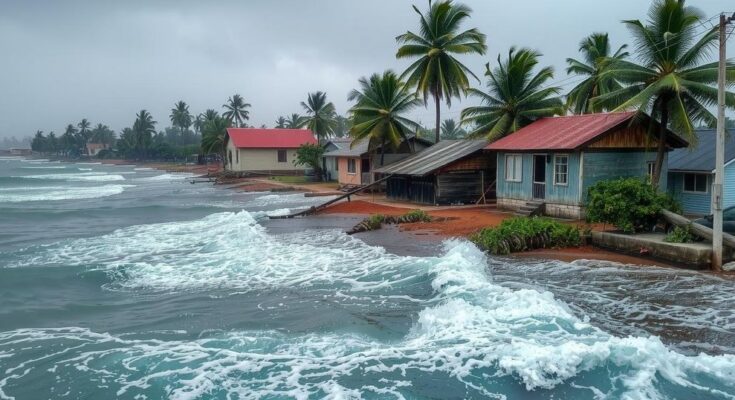Cyclone Chido has caused extensive devastation across Mayotte and Mozambique, with over 120 reported fatalities and significant infrastructure damage. The heavy destruction has left approximately 380,000 people affected, with urgent needs for shelter, food, and medical support. Humanitarian International is assessing the situation to provide necessary aid to the impacted populations, especially vulnerable groups such as children and individuals with disabilities.
Cyclone Chido has wrought havoc across Mayotte and Mozambique, leaving behind a humanitarian crisis of alarming proportions. Following its path from Madagascar to Mozambique, with winds reaching up to 243 km/h, the cyclone has resulted in significant destruction of infrastructure and communities. Reports indicate that over 120 lives have been lost in Mozambique and approximately 35 in Mayotte, with thousands injured and countless homes rendered uninhabitable.
In Mayotte, the cyclone’s ferocity has led to widespread devastation, particularly in impoverished neighborhoods. Many families, such as that of eight-year-old Kamar, have lost their homes entirely, necessitating urgent assistance in food, water, clothing, and shelter. The catastrophic situation in Mozambique is similarly dire, with tens of thousands of homes destroyed, leaving around 380,000 individuals affected, including over 90,000 children.
Specific regions, particularly Mecúfi and Metuge, have suffered severely, as confirmed by Pauline Jacquart, the Mozambique programme director for Humanitarian International (HI). In Mecúfi alone, an overwhelming 99% of residences have been damaged, displacing 16,000 families amidst the incoming rainy season, exacerbating the need for emergency relief.
HI is mobilizing its resources to assess and address the urgent needs of the affected populations, focusing on vulnerable groups such as individuals with disabilities. Claire, an emergency nurse in Mayotte, paints a grim picture of the aftermath, describing the landscape as destroyed and unrecognizable. The pressing requirements include access to drinking water, food, and waste management solutions.
Cyclone Chido, which struck between December 14th and December 17th, has been classified as a significant weather event impacting several regions in southern Africa. The cyclone’s path began in Madagascar, proceeding to Mayotte and eventually reaching northern Mozambique and southern Malawi. Its powerful winds and intense rainfall created a rapidly deteriorating humanitarian situation, affecting several humanitarian operations in the region. The United Nations reports extensive loss of life and widespread displacement, with implications for both health and infrastructural services. As an ongoing humanitarian emergency, the need for immediate assessments and interventions is critical to alleviate suffering and restore basic services.
In conclusion, Cyclone Chido has severely impacted Mayotte and Mozambique, resulting in a significant humanitarian crisis. The loss of life and widespread destruction across both regions requires immediate international and local assistance. Humanitarian organizations like HI are focused on providing essential support, particularly to the most vulnerable populations affected by this disaster. Ongoing assessments are vital to effectively coordinate relief efforts and address the extensive needs resulting from this catastrophic event.
Original Source: reliefweb.int




